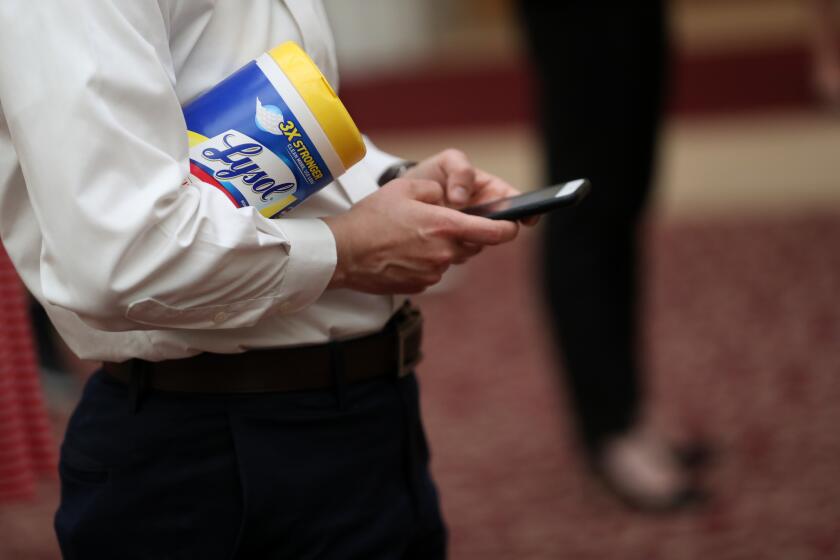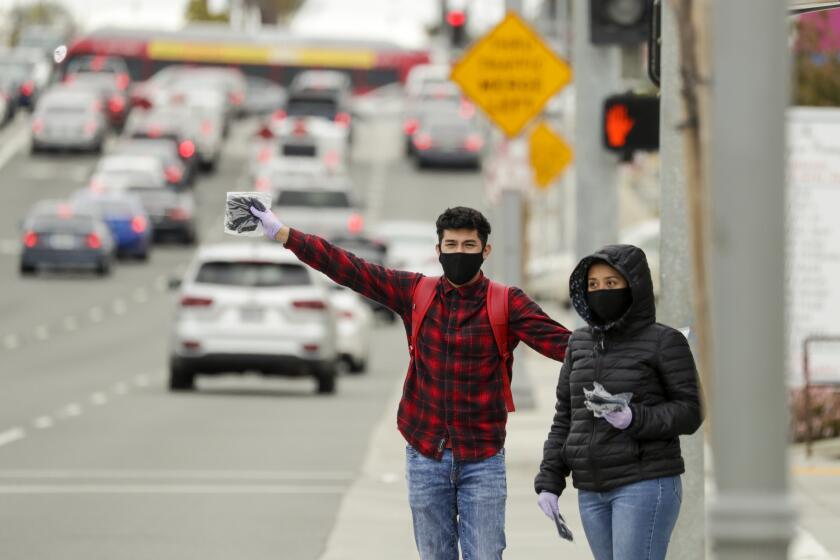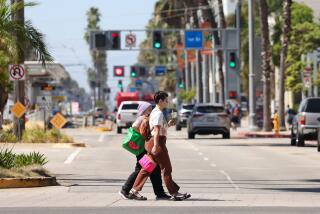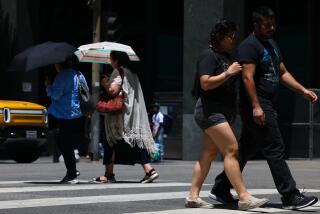Coronavirus and smoking: How do cigarettes, pot and vaping affect infections and outcomes?
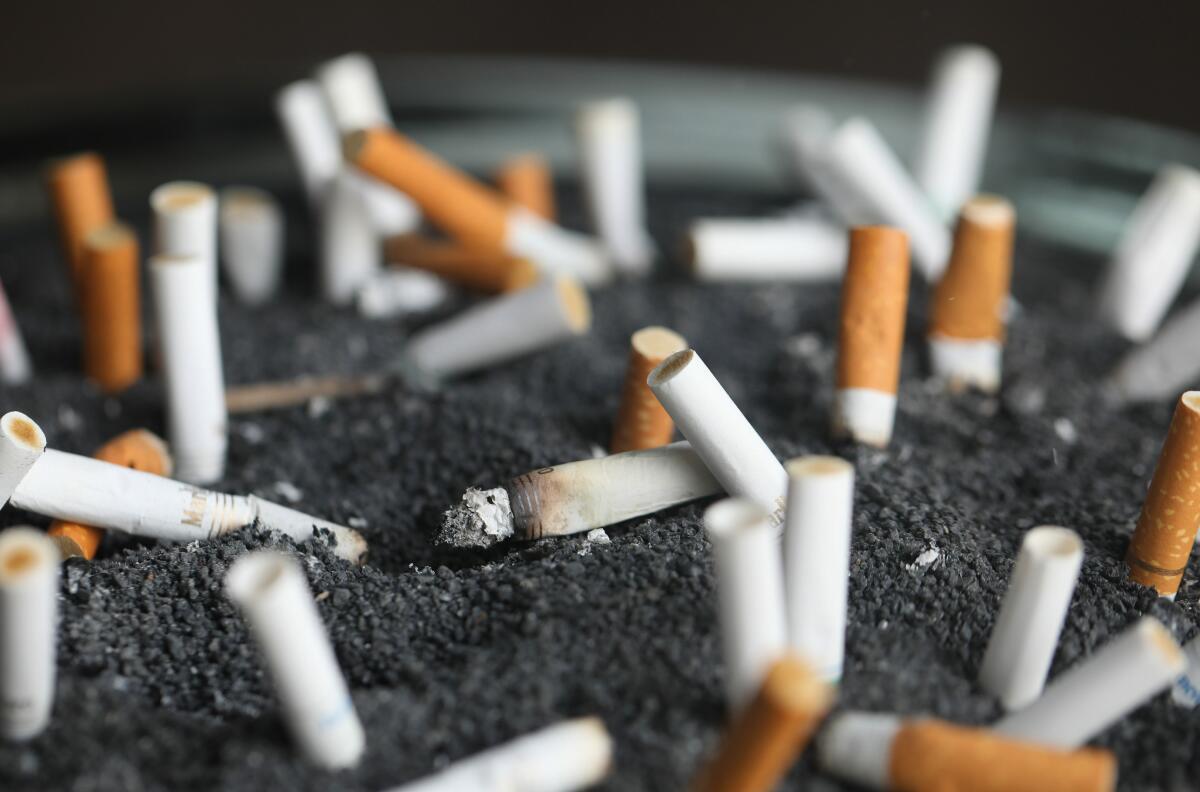
- Share via
In times of stress, like living through a global pandemic, it’s natural to fall back on soothing habits — gardening, playing video games or, for some, lighting up a cigarette or taking a pull on a marijuana vape pen.
But what are the risks, given that the novel coronavirus at the center of the current crisis attacks the lungs?
The science is in its early stages, but studies are finding that cigarette smokers are more likely to have severe infections — a fact many lung doctors say doesn’t surprise them.
“It’s now pretty clear that there is data to show that if you are a smoker, you’re more likely to have adverse outcomes from COVID-19, need mechanical ventilation and to die than if you’re not a smoker,” said Richard Castriotta, a doctor specializing in pulmonary critical care at Keck Medicine of USC.
Smoking damages the lung’s defense mechanisms, making it harder to fight off COVID-19 and other respiratory diseases, according to several doctors who specialize in chest conditions like pneumonia, asthma and tuberculosis.
One of the disease’s main targets is the lungs, and injured lungs have more trouble fighting off COVID-19 and other respiratory diseases, Castriotta said.
The maker of Lysol and another disinfectant says its products should not be used as an internal treatment for the coronavirus.
What does science say?
Early data was conflicting. Some reports indicated that smoking was not associated with increased adverse outcomes and that smokers were underrepresented in hospital settings, leading some — such as the celebrated painter David Hockney — to claim that smokers might even have immunity to the virus that has claimed more than 1,500 lives in California.
Stanton Glantz, director of a tobacco research and education center at the University of California San Francisco, called the claims “really fringe stuff,” primarily being pushed by tobacco and vaping advocates. A meta-analysis helmed by his research team that combined data from 12 studies on the topic has debunked them, he said.
Current smokers face double the risk of disease progression, according to a pair of recent studies cited by Glantz. One study from China indicated that it increased the risk by a factor of four. Another study found that of those who died of COVID-19, 9% were current smokers, compared with 4% of those that survived.
“And that’s exactly what you’d expect, based on what we know about the biology,” Glantz said.
Smoking hinders the function of cilia, small hair-like projections that line the respiratory tract, which “beat up and out any kind of particles that are inhaled,” said Kathryn Melamed, a pulmonary and critical care physician at UCLA Medical Center.
Smoking also inhibits blood cells that would otherwise clean and repair damaged lungs, she said.
The FDA has issued a warning contradicting President Trump’s advice on drugs to treat COVID-19 after patients experienced heart issues.
What about vaping?
Less is known about how coronavirus patients who use vaping and e-cigarette products are faring, given a dearth of relevant studies, but several doctors suspect their trajectory will mirror that of cigarette smokers.
“Vaping has all the same adverse effects as smoking does,” Glantz said.
Marijuana?
Messaging in the medical marijuana space has been to switch to edibles or tinctures if possible, although several doctors said they weren’t familiar with literature that looked at the impact of smoking cannabis on coronavirus infections.
That’s what Peter Grinspoon, a primary care physician in Boston and longtime medical marijuana advocate, said he’s advising patients to do.
“Two packs of cigarettes a day is obviously worse than a puff of cannabis a month, but smoking anything can irritate the lining of your lungs,” Grinspoon said.
He added: “It just seems intuitively true that if you irritate the lining of your lungs, you set yourself up for trouble in a disease that happens to cause most of its mortality by attacking your lungs.”
Cannabis sales in California have been booming during the pandemic, and Grinspoon said many patients are using it to treat anxiety likely exacerbated by the public health crisis. He said he supports the responsible use for those symptoms but cautioned inexperienced users to “start low and go slow” with the dosage to avoid increasing anxiety.
What about secondhand smoke?
Glantz said he’s familiar with one study that showed that smokers did not expel more of a respiratory virus than non-smokers, although they do cough more.
“The smoke itself doesn’t seem to increase the amount of virus that gets in the air,” he said.
However, he said that to the extent that the virus is carried in tiny aerosol particles that stay in the air, one of the possible means of transmission, the smoke shows where those particles are located.
“It’s like, if you have a stream and you’re putting some clear pollutant in it, and then you drip food coloring in it to see where the stream is going,” Glantz said. “So the cigarette smoke or aerosol acts kind of like a marker of where it is.”
In other words, if you can smell it or see it, you know where the virus could be.
Another study showed that people who had been exposed to secondhand smoke were more likely to contract tuberculosis and didn’t do as well as those who weren’t exposed to smoke once they got it, Glantz said.
“So in terms of these immuno-suppressive effects, as it relates to tuberculosis, secondhand smoke has adverse effects,” he said. “In fact, they’re surprisingly big.”
A UCLA medical epidemiologist and infectious disease expert discusses a possible timeline for reopening California after the coronavirus shutdown.
What don’t we know?
Melamed, who is working on the front lines caring for sick COVID-19 patients, said even though the most recent studies on cigarette smoking make intuitive sense to her, more research is needed to draw firm conclusions.
“We all have to acknowledge this is a growing, evolving process,” Melamed said. “We’re learning as we go, and so we’re all doing our best with preliminary and limited data.”
There’s still not enough information to know if smokers are at more risk for getting infected with the coronavirus, according to Melamed and Castriotta.
“You don’t know how many patients are smokers, who have coronavirus and who are at home doing well,” Melamed said.
Castriotta agreed that without expanding testing to a larger population, it’s unknown.
He said the outcome is less ambiguous for infected smokers: “If you do get it, you’re more likely to go into respiratory failure.”
And there’s no question that smoking is bad for your overall health.
“The best time to quit smoking is always right now,” he added.

